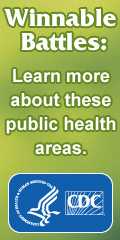June 2017
Did You Know? is a weekly feature from the Office for State, Tribal, Local and Territorial Support to inform your prevention activities. We invite you to read, share, and take action!
View the Current Did You Know?
June 30, 2017
- According to data available on AtlasPlus, more than 1,520,000 cases of chlamydia, nearly 400,000 cases of gonorrhea, and nearly 24,000 cases of syphilis were reported to CDC in 2015.
- The updated AtlasPlus provides easy access to the latest national, state, and county data on HIV, viral hepatitis, sexually transmitted infections, and tuberculosis.
- Use the AtlasPlus online tool to create charts, tables, and maps; look at trends; and see community-specific tools.
June 23, 2017
- Sickle cell disease—a group of inherited red blood cell disorders—can cause health problems that require care in a hospital or clinic emergency department (ED).
- People with sickle cell disease who go to EDs sometimes face longer wait times or are perceived as drug-seeking because their symptoms might be less visible.
- ED healthcare providers [PDF-334KB] can use new CDC resources to help improve the care of patients with sickle cell disease [PDF-246KB] who seek care in EDs.
June 16, 2017
- An influenza pandemic is a global outbreak of a new influenza A virus. Because a flu pandemic is unpredictable, it can occur at any time.
- Over the last 100 years, only 4 flu pandemics have occurred, but they resulted in close to 1 million deaths in the United States.
- Public health professionals can use CDC’s updated Community Mitigation Guidelines to Prevent Pandemic Influenza–United States, 2017 to prepare now for a flu pandemic.
June 9, 2017
- Legionnaires’ disease is especially risky in healthcare settings, where many patients are more vulnerable to the disease.
- One in 4 people [PDF-3.5MB] who gets sick with Legionnaires’ disease in a healthcare facility will die.
- Healthcare facilities can protect patients from Legionnaires’ disease by implementing effective water management programs.
June 2, 2017
- Many of public health’s biggest successes rely heavily on law.
- Legal interventions play a vital role in addressing emerging public health threats, such as healthcare quality, emergency preparedness, and prescription drug overdoses.
- CDC’s Public Health Law Program can provide training, guidance and information on these topics and others.
Did You Know? information and web links are current as of their publication date. They may become outdated over time.
- Page last reviewed: June 30, 2017
- Page last updated: June 30, 2017
- Content source:



 ShareCompartir
ShareCompartir



